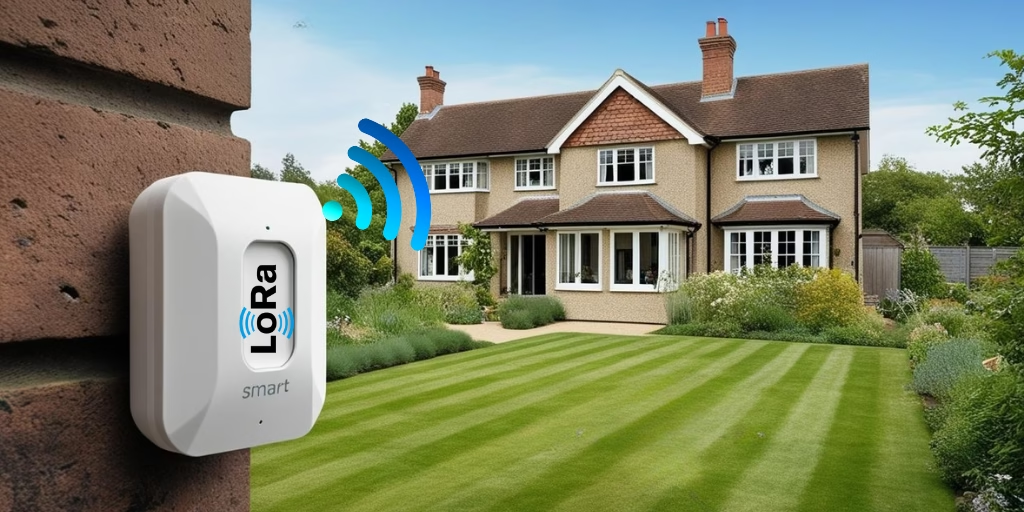LoRa: Long-Range Smart Home Connectivity for Outdoor Devices
LoRa (Long Range) technology has grown in popularity for smart home \ IoT applications, particularly in domestic smart home setups where reliable connectivity and extended range are required. Its ability to connect devices over long distances with low power consumption makes LoRa a practical choice for expanding smart home beyond the walls of your house.
What Makes LoRa Ideal for Smart Homes
LoRa is particularly useful for homes that need smart device coverage over large areas, such as gardens, garages, sheds, Garden cabins \ home offices or outdoor storage.
- Long Range: Unlike Zigbee (see LoRa v Zigbee), Wi-Fi, or Bluetooth, which are generally limited to short range, the domestic version of LoRa can communicate with devices up to 1/4 mile a way. There are industrial LoRa devices with ranges reaching up to 10 miles.
- Low Power Consumption: Many LoRa devices are battery powered and can last years without requiring battery replacements. This is ideal for outdoor sensors or devices that aren’t easily accessible.
- Reliable Signal: LoRa’s signal can penetrate obstacles such as walls and trees, ensuring consistent connectivity to devices placed in garages, basements, or distant corners of a property.
How Can LoRa Be Used in Smart Home Scenarios
LoRa’s long range capabilities provide solutions for various domestic applications:
- Outdoor Monitoring: Keep track of soil humidity levels, weather conditions, or detect leaks in outdoor pipes using LoRa enabled sensors.
- Smart Irrigation Systems: Automate garden watering based on soil conditions using LoRa enabled irrigation systems, ensuring your plants get the care they need without constant supervision.
- Garden office, Garage and Shed Security: Extend your smart home network to garden log cabins, garages, sheds, or outdoor storage spaces with LoRa motion and door sensors. Long range connectivity gives coverage without the need of adding repeaters.
Pros and Cons of LoRa for Smart Homes
- Pros:
- Exceptional range covers large areas without needing multiple repeaters.
- Low power consumption for devices giving long battery life, 5 or more years.
- Reliable signal even in challenging environments, like basements or metal sheds.
- Scalable network with the ability to connect many devices to a single gateway.
- Cons:
- Slower data rates compared to Wi-Fi, making it unsuitable for high-bandwidth tasks like streaming video.
- Requires a LoRa gateway \ hub, adding an additional component to your smart home ecosystem.
- Not as widely adopted in residential setups, limiting device choices compared to wireless technologies like Zigbee or Z-Wave.
YoLink: A Leader in LoRa Smart Home Devices
One of the most prominent manufacturers leveraging LoRa for smart homes is YoLink, a division of YoSmart.
YoLink product line Includes:
- Leak Detectors: Ideal for monitoring indoor and outdoor areas prone to water leaks.
- Motion Sensors: Extend security to outdoor spaces or garages.
- Smart Plugs: Control outdoor devices remotely with long-range connectivity.
- Garage Door Controllers: Ensure seamless control over garage access even from long distances.
- Contact Sensors: Can be used to detect when gates and doors have been opened \ closed
- Smart Valves: Control water flow
YoLink devices are well suited for smart home ecosystems due to their features and compatibility with platforms like Amazon Alexa and Home Assistant
Integrating LoRa into Existing Smart Home Solutions
Integrating LoRa into your existing smart home setup is fairly straightforward, especially if you’re using Alexa or Home Assistant. If you’re using other smart home systems you may have to use Alexa or Home Assistant as a ‘middle man’, if there are no direct integration options
- LoRa Gateway: To connect LoRa devices, a LoRa gateway acts as the bridge between devices and the internet.
- Hybrid Networks: Use LoRa for outdoor devices while Zigbee, Z-Wave, or Wi-Fi handles indoor connectivity.
- Voice and Routine Integration: LoRa devices that are compatible with Alexa or Google Assistant can be seamlessly integrated into your routines for enhanced automation.
- Cloud Management: LoRa devices typically offer cloud integration, enabling remote monitoring and control through mobile apps.
Conclusion
LoRa technology is an innovative solution for extending smart home capabilities to outdoor spaces and addressing connectivity challenges over large areas. With reliable long range communication and energy efficiency, LoRa is particularly well suited for gardens, garages, and other outdoor applications. Manufacturers like YoLink make it easier than ever to integrate LoRa into your smart home network.





